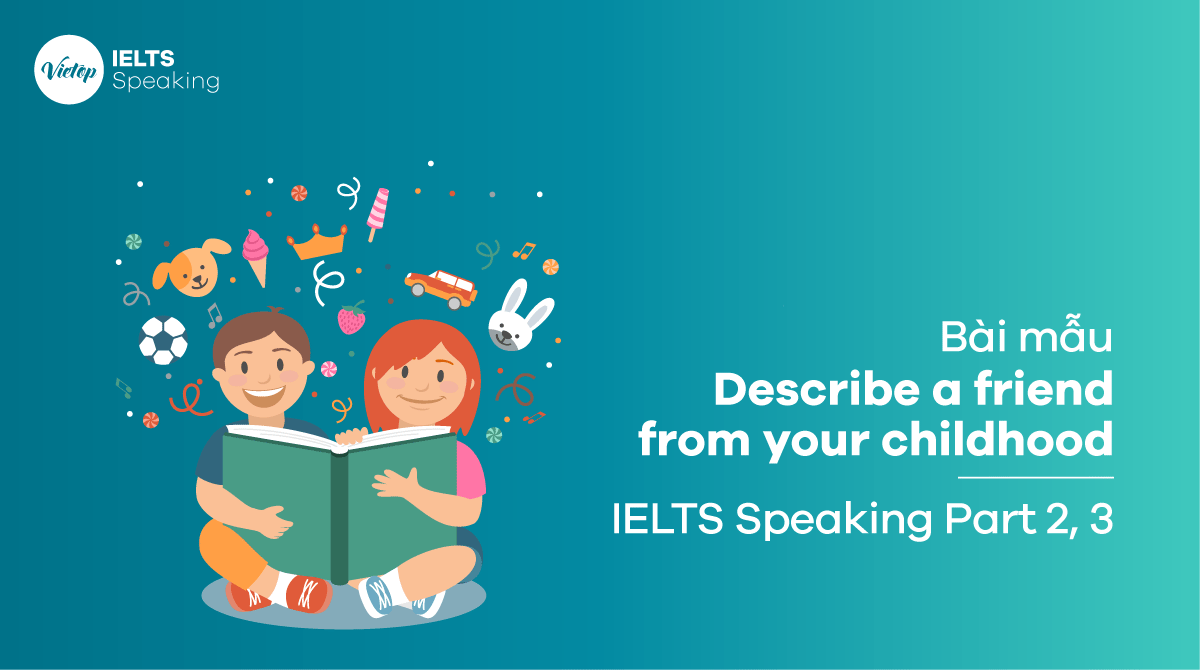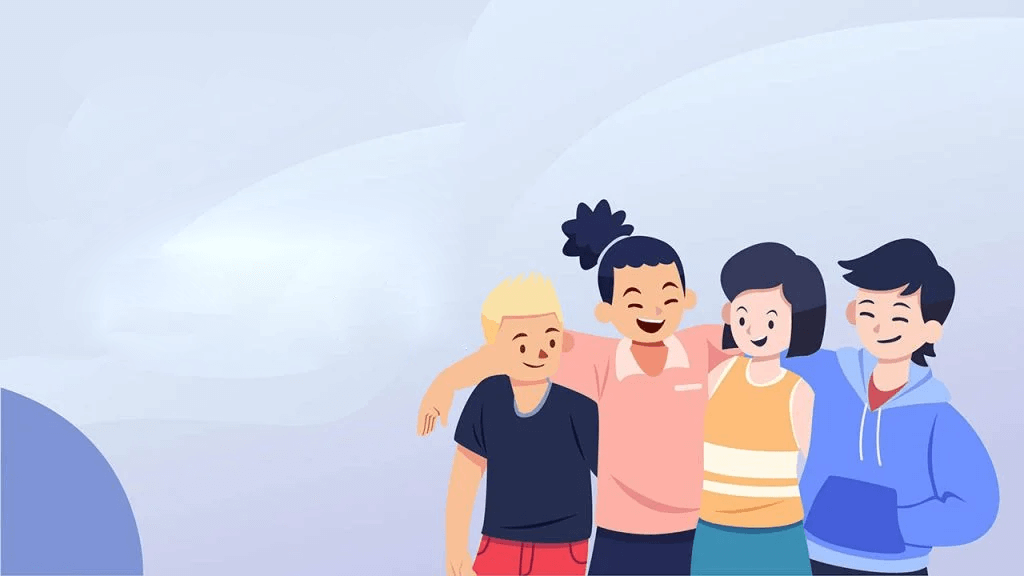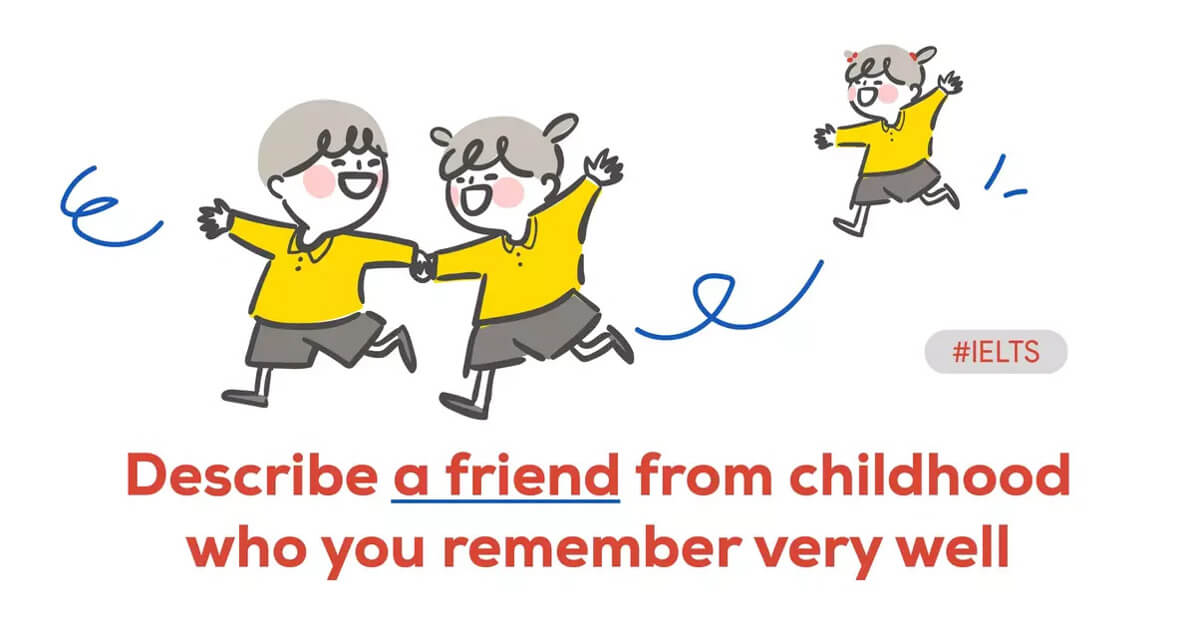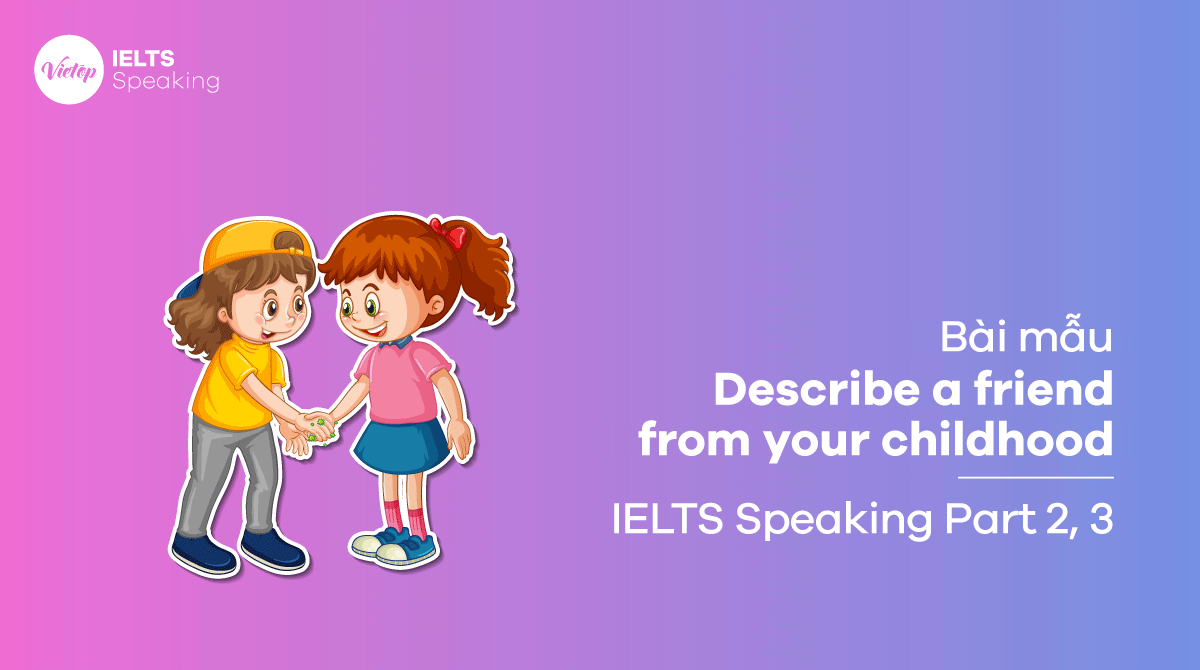Miêu tả người là một chủ đề quen thuộc, hay gặp trong phần IELTS Speaking part 2, nhưng có một số thí sinh vẫn còn gặp khó khăn khi có quá nhiều hoặc quá ít ý tưởng. Với bài viết hôm nay, IELTS Vietop giới thiệu đến các bạn bài mẫu topic Describe a friend from your childhood – IELTS Speaking part 2, 3. Mời các bạn tham khảo qua nhé!
Phân tích đề bài Describe a friend from your childhood

Describe a friend from your childhood.
You should say:
- Who is this person?
- How did you become friends with this person?
- What kinds of things do you like to do with this person?
- Explain why you like him/her.
Với đề bài này, người ta sẽ yêu cầu bạn mô tả một người bạn từ thời thơ ấu. Gợi ý cho nội dung bài nói của bạn được đề bài đưa ra như sau:
- Người đó là ai?
- Tại sao hai người lại trở thành bạn bè?
- Bạn thích làm hoạt động gì chung với người đó?
- Giải thích tại sao bạn thích làm bạn với người đó.

Nhận tư vấn miễn phí khóa học hè
Từ vựng chủ đề Describe a friend from your childhood

- Childhood (n) – Tuổi thơ
E.g.: My childhood friend and I used to play together all the time.
- Loyal (adj) – Trung thành
E.g.: My friend was always loyal to me, even when others weren’t.
- Playful (adj) – Vui tươi, đùa nghịch
E.g.: We had a playful relationship and always found ways to have fun together.
- Imaginative (adj) – Sáng tạo, tưởng tượng
E.g.: My friend had a very imaginative mind and would come up with the most creative ideas.
- Cheerful (adj) – Vui vẻ, hồn nhiên
E.g.: My friend had a cheerful personality and always had a smile on their face.
- Trustworthy (adj) – Đáng tin cậy
E.g.: I knew my friend was trustworthy and could always count on them.
- Adventurous (adj) – Phiêu lưu, thích thử thách
E.g.: My friend was adventurous and always wanted to try new things.
- Supportive (adj) – Hỗ trợ, động viên
E.g.: My friend was very supportive and always encouraged me to pursue my dreams.
- Generous (adj) – Hào phóng, rộng lượng
E.g.: My friend was generous and would often share their toys and treats with me.
- Kind-hearted (adj) – Tốt bụng, có trái tim ấm áp
E.g.: My friend was kind-hearted and always had a soft spot for animals.
- Outgoing (adj) – Hoạt bát, thân thiện
E.g.: My friend was outgoing and always made new friends easily.
- Enthusiastic (adj) – Hăng hái, nhiệt tình
E.g.: My friend was enthusiastic about everything and always had a positive attitude.
- Talkative (adj) – Nói nhiều, hòa đồng
E.g.: My friend was very talkative and loved to tell stories.
- Sincere (adj) – Thật thà, chân thành
E.g.: My friend was sincere and always spoke their mind.
- Dependable (adj) – Đáng tin cậy, có thể dựa vào
E.g.: My friend was dependable and would always be there for me when I needed them.
- Respectful (adj) – Tôn trọng, lễ phép
E.g.: My friend was respectful and always treated others with kindness.
- Courteous (adj) – Lịch sự, lễ phép
E.g.: My friend was courteous and always had good manners.
- Ambitious (adj) – Tham vọng, có hoài bão
E.g.: My friend was ambitious and had big dreams for the future.
- Humorous (adj) – Hài hước, vui nhộn
E.g.: My friend was humorous and always made me laugh.
- Intelligent (adj) – Thông minh, lanh lợi
E.g.: My friend was intelligent and always did well in school.
Ngoài ra, bạn có thể tham khảo thêm các bài mẫu và từ vựng liên quan đến chủ đề miêu tả con người do Vietop tổng hợp dưới đây:
- Từ vựng miêu tả con người
- Từ vựng tiếng Anh về tính cách con người
- 99+ idioms mô tả người hay gặp trong IELTS (Idioms to describe a person)
- IELTS Vocabulary topic Appearance – Chủ đề Ngoại hình
- Bài mẫu Topic Describe A Person – IELTS Speaking Part 1, 2, 3
- Bài mẫu Topic Describe A Famous Person – IELTS Speaking Part 2
Sau đây, mời các bạn đến với bài mẫu Topic Describe a friend from your childhood.
Bài mẫu IELTS Speaking part 2 Topic Describe a friend from your childhood

Mời bạn cùng nghe Podcast bài mẫu Part 2 của IELTS Vietop nhé:
Describe a friend from your childhood.
You should say:
- Who is this person?
- How did you become friends with this person?
- What kinds of things do you like to do with this person?
- Explain why you like him/her.
Lưu ý rằng bạn có thể không cần phải đi theo trình tự như trên mà có thể linh hoạt thay đổi thứ tự các ý, miễn rằng nội dung bài nói của bạn không bị thiếu hụt và vẫn đáp ứng được yêu cầu “miêu tả một người bạn thời thơ ấu của bạn”.
The person I would like to talk about is my childhood friend, Julie. We became friends when we were both in primary school, around seven years old. I remember we were in the same class and we started talking to each other one day during recess. We discovered that we had a lot in common, such as our love for playing outdoors and our interest in animals.
Growing up, Julie and I would often spend our weekends exploring the nearby park, climbing trees, and chasing after butterflies. We loved to collect flowers and leaves and make collages out of them. We also enjoyed playing board games and having picnics in the park.
What I like most about Julie is her kind-hearted nature and her sense of humour. She was always the first to offer help to anyone in need, whether it was a classmate who needed help with homework or a stray animal that needed food. Her infectious laughter always made me feel happy and I loved how we could joke around with each other and have a good time.
Even though we have grown up and gone our separate ways, we still keep in touch and meet up whenever we can. Whenever we talk, it feels like no time has passed thus we can still laugh and reminisce about our childhood memories. Julie is a wonderful friend who has been a constant source of joy and support in my life.
- Primary school (n) – Trường tiểu học
- Recess (n) – Giờ giải lao
- Common (adj) – Chung, giống nhau
- Outdoors (adv) – Ngoài trời
- Collage (n) – Tấm hình ghép
- Kind-hearted (adj) – Tốt bụng, có trái tim ấm áp
- Sense of humor (n) – Khiếu hài hài hước
- Joke around (phrasal v) – Nói đùa, đùa cợt với nhau
- Reminisce (v) – Nhớ lại, hồi tưởng
- Constant (adj) – Liên tục, không đổi
Xem thêm bài mẫu Speaking:
- Bài mẫu topic Transportation – IELTS Speaking part 1
- Bài mẫu The area that you live – IELTS Speaking Part 1
- Bài mẫu IELTS Speaking part 1: Topic Writing – Topic In Relationship – Bài mẫu IELTS Speaking part 1, 2, 3
IELTS Speaking Part 3 sample topic Describe a friend from your childhood

Mời bạn cùng nghe Podcast bài mẫu Part 3 của IELTS Vietop nhé:
1. Should everyone have close friends, why?
Yes, I think everyone should have close friends since they provide emotional support, help us grow as individuals, and enhance our social lives. Close friends offer comfort, different perspectives, and opportunities for fun and enjoyment thus it is essential to cultivate and maintain strong friendships throughout our lives.
- Emotional support (n): hỗ trợ tinh thần – sự giúp đỡ hoặc an ủi cho ai đang trải qua khoảng thời gian khó khăn
- Enhance (v): nâng cao, mở rộng
- Perspective (n): mảng, góc độ
- Opportunity (n): cơ hội
- Essential (n): quan trọng
- Maintain (v): duy trì – giữ trong tình trạng tốt hoặc bảo tồn
2. Should we have more friends or fewer friends?
I must say that there is no set number of friends that is ideal for everyone. Some people prefer to have a few close friends, while others enjoy having a larger social circle. It really depends on personal preference and lifestyle. What matters most is that the friendships we have are meaningful and fulfilling, regardless of the quantity.
- Ideal (adj): lý tưởng
- Social circle (n): vòng bạn bè
- Personal preference (n): sở thích cá nhân
- Lifestyle (n): lối sống
- Meaningful (adj): có ý nghĩa
- Fulfilling (adj): vui vẻ, hài lòng
3. Why should we have friends?
There are various reasons why we should have friends. Friends provide emotional support and contribute to our overall well-being. They can offer a fresh outlook and new experiences that expand our horizons. A strong social network can also reduce stress, since they can introduce us to new people and experiences, and help us create lasting memories.
- Various (adj): khác nhau
- Contribute (v): đóng góp
- Overall (adj): tổng thể
- Well-being (n): hạnh phúc
- Fresh (adj): mới mẻ
- Outlook (n): quan điểm
- Expand (v): mở rộng
- Social network (n): mạng lưới xã hội
- Reduce (v): giảm thiểu
- Introduce (v): giới thiệu
- Memories (n): ký ức
4. Is having a few good friends better than many friends?
I’d say that there is no right or wrong answer to this question, as it ultimately depends on personal preference and circumstances. Some people prefer having a few close friends, as they value deeper connections and intimacy. Others enjoy having many friends, as they appreciate a wider social circle and diverse experiences. What matters most is the quality of the friendships, rather than the quantity.
- Preference (n): sở thích
- Circumstances (n): hoàn cảnh
- Close (adj): thân thiết
- Intimacy (n): sự thân mật
- Appreciate (v): đánh giá cao
- Wider (adj): rộng hơn
- Diverse (adj): đa dạng
- Quality (n): chất lượng
5. What is it like not to have friends in childhood?
I think not having friends in childhood can be a lonely and isolating experience. Children who lack social connections may struggle with self-esteem, communication, and interpersonal skills. They may also miss out on important opportunities for play, exploration, and learning. Without friends to confide in, they may also be more vulnerable to stress and mental health issues.
- Isolating (adj): cô lập
- Self-esteem (n): lòng tự trọng
- Communication (n): giao tiếp
- Interpersonal (adj): giữa những người
- Miss out on (phrasal verb): bỏ lỡ
- Exploration (n): khám phá
- Confide in (phrasal verb): tâm sự
- Vulnerable (adj): dễ bị tổn thương
- Stress (n): căng thẳng
- Mental health (n): sức khỏe tâm thần
Xem thêm:
Describe a popular product made in your region
Cách phát âm đuôi ed trong tiếng Anh chuẩn
6. Why is it easier to talk to friends rather than your family? (IELTS speaking part 3 sample, around 50 words & note some useful words from the sample above (with their form and Vietnamese meaning)
To my mind, this could be explained by the reason that friends are perceived as less judgmental and more supportive. Family members may have preconceived notions about us that can hinder open communication, while friends are more likely to offer unbiased advice. Additionally, friends may be more relatable and share similar experiences, making it easier to connect and empathize with one another.
- Perceived (v): đánh giá
- Judgmental (adj): phán xét
- Supportive (adj): hỗ trợ
- Preconceived notions (n): quan niệm tiền định
- Hinder (v): cản trở
- Open communication (n): giao tiếp mở
- Unbiased (adj): không thiên vị
- Advice (n): lời khuyên
- Relatable (adj): dễ cảm thông
- Empathize (v): đồng cảm
7. you still keep in touch with your friends from childhood? Why or why not?
Yes, I do still keep in touch with some of my friends from childhood. In fact, I think it’s important to maintain those relationships because childhood friends have a special place in our hearts and can provide a sense of comfort and familiarity that is hard to find elsewhere.
- Keep in touch (phrase) – Giữ liên lạc
- Maintain (v) – Giữ, duy trì
- Relationship (n) – Mối quan hệ
- Special (adj) – Đặc biệt
- Comfort (n) – An ủi, sự thoải mái
- Familiarity (n) – Sự quen thuộc
8. How important is childhood friendship to children?
I believe that childhood friendship is very important to children as it helps them develop social skills, learn how to share, cooperate and build a sense of trust and loyalty. These early relationships can also provide a sense of security and comfort, as children navigate the challenges of growing up. Friendships can help children build confidence and self-esteem, as well as a sense of identity and belonging.
- Social skills (n) – Kỹ năng xã hội
- Cooperate (v) – Hợp tác, cộng tác
- Trust (n) – Sự tin tưởng, niềm tin
- Security (n) – Sự an toàn, sự bảo đảm
- Self-esteem (n) – Tự trọng, lòng tự tôn
9. Do you think online social media will replace face-to-face communication?
I don’t think online social media will completely replace face-to-face communication. While social media has made it easier to connect with people from all over the world, it cannot fully replicate the experience of meeting someone in person. Face-to-face communication allows us to convey nonverbal cues like body language and tone of voice, which adds depth to our conversations. It also helps us build stronger relationships. However, social media can still be useful for maintaining existing relationships and connecting with new people who share similar interests.
- Completely (adv) – Hoàn toàn
- Replicate (v) – Tái tạo, sao chép
- Convey (v) – Truyền đạt, truyền tải
- Depth (n) – Độ sâu
- Stronger (adj) – Mạnh mẽ, chắc chắn hơn
- Existing (adj) – Đã có sẵn, hiện tại
- Connect (v) – Kết nối, liên kết
Trên đây là bài mẫu Topic Describe a friend from your childhood – IELTS Speaking part 2, 3 IELTS Vietop hy vọng đã có thể giúp các bạn tham khảo được thêm nhiều từ vựng và ý tưởng để chuẩn bị tốt hơn cho chủ đề này. Chúc các bạn học tốt và hẹn các bạn ở những bài viết sau!











